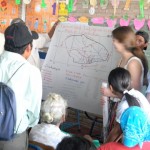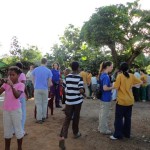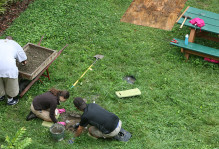Progress
It may be that blogs have gone the way of postcards. Again, I have been a poor correspondent and note that I wrote last in March — during the annual MANOS project trip. The SOMOS advance team is in the Dominican Republic as I write; the full team arrives on Saturday. At the same time, a MANOS research team will be in Nicaragua.
Both projects have gone amazingly well — and dreadfully slowly. Participatory development is notoriously slow and not uncommonly painfully so. Some speak casually of “teaching a person to fish,” imagining that as a way of characterizing the work we do in Nicaragua and the Dominican Republic. It is nowhere nearly that easy (though I’ve had my share of difficulties in teaching people to fish as well!). We have a clear and specified approach to community capacity building. We promote organized and improvised collective actions that build infrastructures that solve collectively defined problems. That’s a mouthful and may seem needlessly jargon-laden. For those of us in SOMOS and MANOS it is a clear, precise, and theoretically and empirically grounded description of an approach and a set of methods and practices.
In the Dominican Republic, we are challenged to work with emerging arrangements to mitigate flooding. There is a “boat committee” that is working with us to find safe and effective ways to use a boat provided through the SOMOS-Esfuerzo partnership. There also is an “EWB committee” comprising local residents and SOMOS representatives. Working together, this committee submitted a proposal to Engineers Without Borders in hopes of undertaking a partnership that would provide broad scale relief from perennial flooding. The EWB representatives declined, noting that the scale of the proposed project was beyond their capacities. They invited further discussion and spoke very positively about the partnering approach reflected in the proposal. We learned that these representatives regard our work in the community as an ideal basis for EWB partnerships. We’re optimistic about limited projects with EWB going forward, and these will be discussed with community residents in the coming week.
The challenges in Nicaragua are, in some ways, even more enticing. Community infrastructure has matured rapidly, with regional groups meeting to discuss aspects of the Five Year Development Plan which was written and approved in collaboration with MANOS. Regional group leaders have cell phones now and the ability to communicate with one another and with MANOS team members to facilitate group-level efforts in anticipation of community meetings. Two significant parts of the Five Year Plan involve improving access to clean water for all households and improving nutrition. Those goals became the focus of a collaborative grant proposal involving the community, two Nicaraguan universities, and MANOS. The proposal was funded and provides for technical consulting (through Nicaraguan university engineers and their students) and materials needed to implement a water access project and gardens to improve nutrition. There have been problems in communication and in working out the roles of community members, university engineers, representatives of the mayor’s office, and MANOS team members. Our goal is to provide the support and technical advice that can optimize community residents’ knowledge and their sense of ownership of the project. Partnering is a much more difficult concept and practice than normally is understood.
We have an exceptional crew traveling to the Dominican Republic this year — again. As always, the medical/clinical team is led by Dr. Mark Ryan (’96) and a member of the very first group that traveled from W&M to the Dominican Republic to promote improved health and health care access. Joining him as physicians are two other founding team members, who were undergraduates on the first trip: Matt Harrington (’05), M.D. and Luke Neilans (’05), M.D. Other M.D.s joining the team this year are Mal Azmi (soon to be at VCU) and Aye Otubu, Howard University School of Medicine. Nurse Practitioner Margo Potts (returning medical provider) will be joined by Nursing/Nurse Practitioner students Marc Bein and Marie Vu. Pharmacy Doctorate (resident) Julie Jeong will be accompanied by PharmD students Nellie Jafari, Liz Budko, and Tim Pierce, all from the VCU School of Medicine.
And so, there is progress and we move ahead. Perhaps it is time to find a new venue for communications about SOMOS and MANOS. It is unclear whether there is an audience for the musings on this blog. Very soon, we expect to formally join forces with an international network of volunteers and community-based projects and organizations that span that globe. We are pursuing discussions with Omprakash leaders that would create a partnership through which SOMOS and MANOS would provide intellectual and academic content, consulting, and mentorship to the network. That arrangement might eventuate in certification arrangements for undergraduates and others who want to pursue international community engagement activities. It might, in time, produce online for-credit courses. Stay tuned (if you’re out there!).
Comments are currently closed. Comments are closed on all posts older than one year, and for those in our archive.




I’m the audience, Dr. Aday! Keep us up to date on the work…there is at least one person out here following the progress.